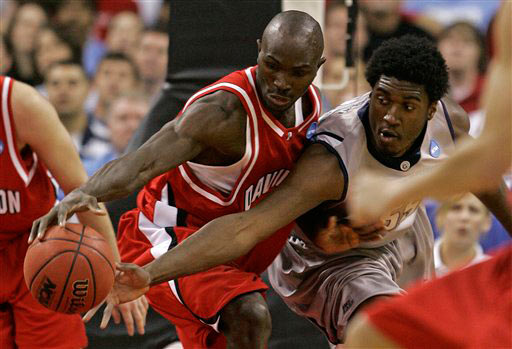March Madness Boosts Student Applications

Get the world’s most fascinating discoveries delivered straight to your inbox.
You are now subscribed
Your newsletter sign-up was successful
Want to add more newsletters?

Delivered Daily
Daily Newsletter
Sign up for the latest discoveries, groundbreaking research and fascinating breakthroughs that impact you and the wider world direct to your inbox.

Once a week
Life's Little Mysteries
Feed your curiosity with an exclusive mystery every week, solved with science and delivered direct to your inbox before it's seen anywhere else.

Once a week
How It Works
Sign up to our free science & technology newsletter for your weekly fix of fascinating articles, quick quizzes, amazing images, and more

Delivered daily
Space.com Newsletter
Breaking space news, the latest updates on rocket launches, skywatching events and more!

Once a month
Watch This Space
Sign up to our monthly entertainment newsletter to keep up with all our coverage of the latest sci-fi and space movies, tv shows, games and books.

Once a week
Night Sky This Week
Discover this week's must-see night sky events, moon phases, and stunning astrophotos. Sign up for our skywatching newsletter and explore the universe with us!
Join the club
Get full access to premium articles, exclusive features and a growing list of member rewards.
Those graceful March Madness layups and 3-pointers can rack up more than NCAA scoreboard points. New research shows that college basketball and football winners indirectly boost the number of student applicants to their campuses.
"We looked at how high-profile sports success influences where students choose to apply for college," said researcher Jaren Pope of the Department of Agricultural and Applied Economics at Virginia Tech. "Anecdotally, college administrators have known for some time that basketball and football success translates into increased applications."
The new study, to be detailed in a forthcoming issue of the Southern Economic Journal, backs up this thinking with science.
Basketball brackets
Pope and his brother Devin Pope at the Wharton School of the University of Pennsylvania, analyzed records of the incoming freshman classes of 330 NCAA Division I colleges and universities based on "Peterson's Guide to Four-Year Colleges." The brothers compared the records with information on how well the schools did in football and basketball each year from 1983 to 2002.
They found that the biggest champs on the courts and fields were also the biggest winners in terms of student applications the next year. In particular, they found the following:
Colleges and universities with football teams in the top 20 showed a 2.5 percent gain in student applications the next year, while the top 10 teams garnered their schools a 3 percent gain. Football championship winners saw a 7 percent to 8 percent jump in applications.
Get the world’s most fascinating discoveries delivered straight to your inbox.
For both sports, the spike in applications continued for several years.
Scholastic sports?
The results shed light on the benefits of schools' investments in athletics.
Debate has persisted since the inception of intercollegiate sports, say the researchers, over whether schools should lavish resources on athletics, for instance by building a new field house or stadium, or allocate those funds to something academic, such as library improvements.
The underlying question was articulated by former California Rep. Bill Thomas, who was chairman of the House Ways and Means Committee, in 2006 when he questioned the NCAA about their tax-exempt status. He asked NCAA president Myles Brand, "How does playing major college football or men’s basketball in a highly commercialized, profit-seeking, entertainment environment further the educational purpose of your member institutions?"
The new study results provide one answer.
"It appears that athletic success does indeed present an opportunity to schools to be either more selective in their admission standards or enroll more students while keeping a fixed level of student quality," the researchers write.
The researchers also checked out the quality of students who were flocking to scoreboard-ranking schools. They found the extra applications included students with both low and high SAT scores.
Some schools cashed in on the flood of applications by selecting higher-quality students.
- The Most Dangerous Sports in America
- Vote: The Most Popular Myths in Science
- Life's Little Mysteries
Jeanna Bryner is managing editor of Scientific American. Previously she was editor in chief of Live Science and, prior to that, an editor at Scholastic's Science World magazine. Bryner has an English degree from Salisbury University, a master's degree in biogeochemistry and environmental sciences from the University of Maryland and a graduate science journalism degree from New York University. She has worked as a biologist in Florida, where she monitored wetlands and did field surveys for endangered species, including the gorgeous Florida Scrub Jay. She also received an ocean sciences journalism fellowship from the Woods Hole Oceanographic Institution. She is a firm believer that science is for everyone and that just about everything can be viewed through the lens of science.
 Live Science Plus
Live Science Plus










